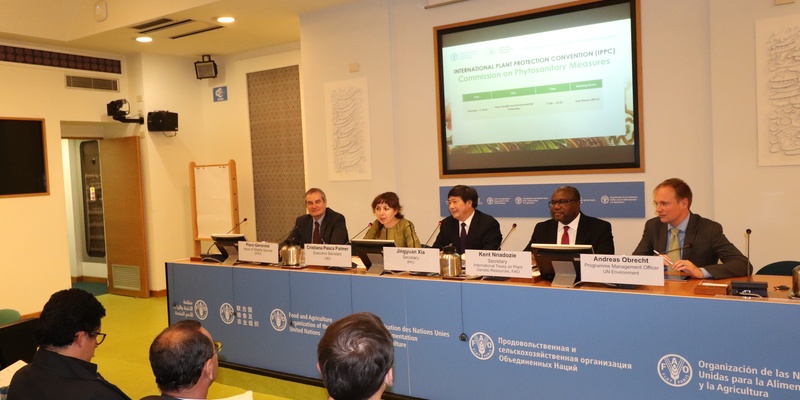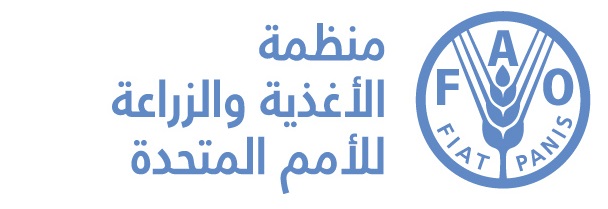CPM-13 Side Session on Plant Health and Environmental Protection held at FAO HQs
Posted on ثلاثاء, 17 إبريل 2018, 18:31

A successful side session on the 2018 IPPC annual theme Plant Health and Environmental Protection was held at FAO Headquarters in Rome on Monday 16 April at the margins of the thirteenth session of the Commission on Phytosanitary Measures (CPM-13). The session, co-organized by the Secretariats of the International Plant Protection Convention (IPPC) and the Convention on Biological Diversity (CBD), was opened by Dr Jingyuan Xia, IPPC Secretary, with presence of over 120 participants. The high-level speakers included Dr Cristiana Pasca Palmer, CBD Executive Secretary; Dr Kent Nnadozie, Secretary of the International Treaty of Plant Genetic Resources for Food and Agriculture (The Treaty); Mr Andreas Obrecht, Programme Management Officer at UN Environment; and Dr Piero Genovesi, the Head of Italian Institute for Environmental Protection and Research (ISPRA) and the Chair of IUCN SSC Invasive Species Specialist Group.
In his opening remarks, Dr Xia highlighted the areas in which the IPPC Secretariat activities are contributing to environmental protection: the development of ISPMs and CPM recommendations, capacity development through PCE tool, risk assessment of emerging pests, as well as the international cooperation and communication. In her speech, Dr Pasca Palmer, recalled: The CBD is a sustainable development convention, with three main objectives: conservation of species, sustainable use of biodiversity resources and benefit sharing of genetic resources. She highlighted the importance of the IPPC work in relation to CBD work, in particular for issues related to invasive alien species and the subsequent achievement of the Aichi biodiversity target 9. She indicated the accessibility to the invasive species database by 34 countries and growing as a milestone for the CBD community. She also called on countries to collaborate at the national level to undertake global environmental challenges.
In his presentation, Dr Nnadozie stated that the interaction between the IPPC and the Treaty are obvious, yet their collaboration can be further boosted for the benefit of both communities. He highlighted: The movement of genetic materials across the borders connects the Treaty to the IPPC, to ensure that there are not consequences as spread of pests. Especially important in that aspect is ISPM 38. He recalled that only five main crops constitute the basis of human diet, therefore it is crucial to maintain and utilize the diversity and benefits from utilization should be shared on global level.
In his address, Mr Obrecht stated: Engagement in communication work can help establish synergies among different treaties and stakeholders involved in environmental protection. He recalled that the biodiversity governance is composed of a huge range of stakeholders, including the IPPC, the CBD and the Treaty, contributing to the area at the global level. He informed that existing strategies are diverse as well, and interactions should be maximized to reach sustainable development goals. He concluded emphasising the need for collaboration, personal contact enhancement, mobilizing resources and using opportunities.
Lastly, Dr Genovesi affirmed: Alien species are important as they are the main drivers of biodiversity extinction globally, accounting for around 16.2% of it. They threaten the whole ecosystems and livelihoods, and they affect human health as well through allergens, toxins, disease vectors, and other factors. He recalled that alien species have a huge cost, amounting to 12.5 billion EUR for Europe per year. How to cope? CBD has identified best strategies - prevention is the first, then early detection followed by emergency measures, he added. He further highlighted that the collection of information is another essential tool to be aware of risks and being able to plan for responses.
You may watch the recording of the session at the following link: http://www.fao.org/webcast/home/en/item/4670/icode/
PPT presentations are available in the publications section at this link.



